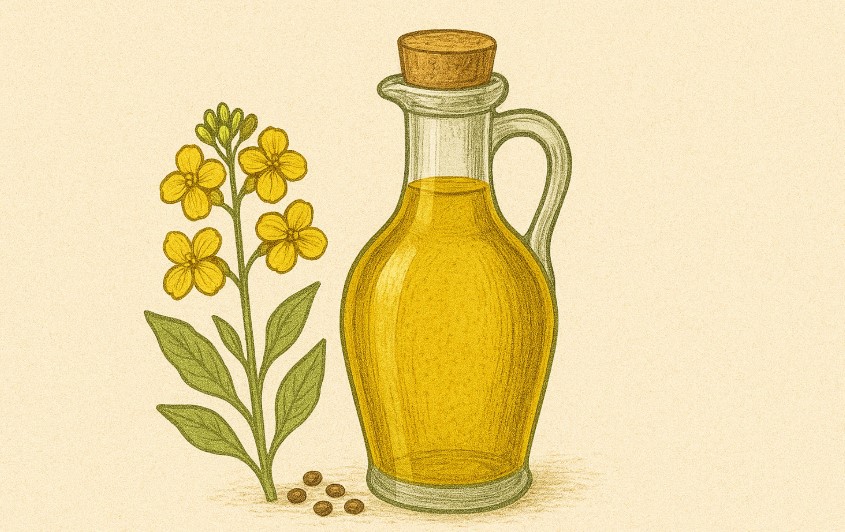Why is Rapeseed Oil Bad for You?
Rapeseed oil, a staple in many UK households and food products, is often perceived as a healthy, heart-friendly oil. It’s affordable, widely available, and marketed as a better alternative to saturated fats.
However, beneath its golden appearance lies a series of ongoing health debates and scientific concerns that make many people wonder why is rapeseed oil bad for you?
Recent research and nutritional discussions have raised red flags over how this oil is produced, its effect on the human body, and its nutritional profile compared to other natural oils. So, should you be concerned about using rapeseed oil in your diet? Let’s examine the facts.
What is Rapeseed Oil?
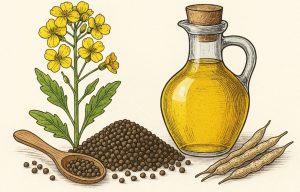
Rapeseed oil is extracted from the seeds of the Brassica napus plant, which belongs to the same botanical family as cabbage, broccoli, and mustard.
The oil has been consumed in various forms for centuries, but its widespread use in cooking is relatively recent, particularly after the development of low-erucic acid variants.
In the UK, rapeseed oil is available in two main forms:
- Refined rapeseed oil: The most common variety, typically used in processed foods and for frying. It’s extracted using high heat and chemical solvents.
- Cold-pressed rapeseed oil: A more natural version, often labelled as extra virgin or organic, made without heat or chemicals to preserve nutrients.
It’s worth noting that what’s known as canola oil in countries like Canada and the US is a genetically modified version of rapeseed oil, bred to contain lower levels of erucic acid.
Why is Rapeseed Oil So Common in the UK?
One of the main reasons rapeseed oil is so prevalent in the UK is its agricultural accessibility. Britain is one of the top producers of rapeseed in Europe. The crop thrives in UK weather conditions, making it a cost-effective and locally sourced ingredient.
In both homes and the food industry, rapeseed oil is used extensively because of:
- Its neutral flavour, which doesn’t overpower other ingredients
- A high smoke point, ideal for frying and roasting
- Its lower price point compared to oils like olive or avocado
You’ll find rapeseed oil in everything from supermarket ready meals and crisps to bakery products, spreads, and margarine. While its ubiquity is convenient, it also means many people are unknowingly consuming large quantities of it daily.
Why is Rapeseed Oil Bad for You?
Despite its widespread use and promotion as heart-healthy, several factors suggest that rapeseed oil may not be as beneficial or harmless as once thought.
Critics argue that the refining process, fatty acid imbalance, and potential contamination with harmful compounds make it questionable from a health perspective.
Some of the core concerns include:
- Inflammatory potential due to a high omega-6 to omega-3 ratio
- Nutrient depletion through chemical processing and bleaching
- Residual solvents like hexane used in extraction
- Possible genetic modification in imported varieties
- Links to chronic conditions such as cardiovascular disease and metabolic syndrome when consumed in excess
While not immediately harmful in small quantities, long-term and frequent consumption may pose health risks especially when better, less processed alternatives are available.
Common Health Concerns Linked to Rapeseed Oil
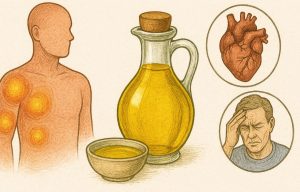
One of the biggest issues with rapeseed oil is its potential to contribute to chronic inflammation.
While omega-6 fatty acids are essential to the human body, an imbalance, particularly when not balanced with sufficient omega-3s, can lead to systemic inflammation, which is a precursor to numerous health issues, including:
- Cardiovascular disease
- Type 2 diabetes
- Obesity
- Rheumatoid arthritis
Additionally, refined rapeseed oil is often stripped of its natural antioxidants during the heating and deodorisation stages.
These antioxidants help protect cells from oxidative stress, and their absence may reduce the health benefits that the oil could otherwise offer.
Concerns have also been raised about cholesterol oxidation. When vegetable oils are repeatedly heated (as in commercial fryers), they may oxidise and create compounds harmful to arteries, even if the original oil was low in saturated fats.
The Role of Processing in Rapeseed Oil’s Negative Effects
The vast majority of rapeseed oil used in the UK is refined. This means the seeds are:
- Heat-treated to increase oil yield
- Treated with hexane, a chemical solvent that helps extract more oil from the seed
- Subjected to bleaching and deodorising, which removes unpleasant odours, colours, and flavours
This process not only eliminates much of the oil’s original nutrient profile, including vitamin E and beneficial polyphenols, but may also leave behind chemical residues.
While these are typically within “safe” limits, long-term cumulative exposure is not fully understood.
Moreover, the high heat can change the structure of fatty acids, potentially creating trans fats, even in small amounts. These artificial fats are known to increase the risk of heart disease.
Genetically Modified Rapeseed – Should You Be Concerned?
In the UK, most rapeseed crops grown locally are non-GM, but the same can’t be said for all imports.
Much of the rapeseed oil found in processed or fast food products comes from genetically modified crops, especially those imported from North America.
While GM foods are not automatically harmful, they come with a range of concerns:
- Lack of long-term, independent studies on health effects
- Possible allergenicity and increased pesticide usage
- Ethical and environmental implications, including crop contamination
For those concerned about GM foods, it’s advisable to look for organic or cold-pressed, non-GMO rapeseed oil labels when shopping.
Comparing Rapeseed Oil with Other Cooking Oils
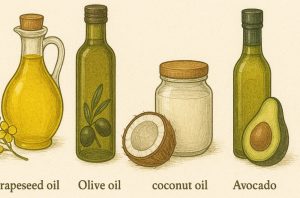
To understand where rapeseed oil stands nutritionally, it’s helpful to compare it to other common oils:
| Oil Type | Omega-6 Content | Processing Level | Smoke Point | Best For |
| Rapeseed Oil | Moderate | Highly processed (refined) or cold-pressed | ~204°C | General cooking, baking |
| Olive Oil | Low | Less processed, rich in antioxidants | ~190°C | Salads, dressings, light sautéing |
| Avocado Oil | Low | Minimal processing, high in monounsaturated fats | ~270°C | High-heat cooking |
| Coconut Oil | Very low | Unrefined or refined | ~177°C | Baking, sautéing, frying |
While rapeseed oil performs well in terms of smoke point and affordability, oils like olive and avocado are richer in nutrients and less likely to contribute to inflammation.
Is Cold-Pressed Rapeseed Oil a Healthier Option?
Cold-pressed rapeseed oil, often dark yellow or golden in colour, is made without high heat or chemical solvents. It retains more of the oil’s natural:
- Vitamin E
- Omega-3 fatty acids
- Polyphenols and antioxidants
This version is considered significantly healthier than refined rapeseed oil, but it is also more expensive and less stable for high-heat cooking. It’s best used in salad dressings or as a finishing oil.
Still, even cold-pressed varieties should be consumed in moderation due to their omega-6 content.
Public Health Opinions and Scientific Evidence
UK health authorities, including the NHS, recognise rapeseed oil as a source of unsaturated fat, recommending it as a substitute for saturated fats like butter.
However, this recommendation is typically based on refined rapeseed oil being better than trans fats or animal fats, not necessarily better than natural oils like olive or avocado.
Recent studies challenge this conventional view. Some research points to a link between excessive intake of seed oils (including rapeseed) and oxidative stress and metabolic issues.
While definitive conclusions remain elusive, the debate is fuelling a shift toward whole-food fats in nutrition circles.
Healthier Alternatives to Rapeseed Oil
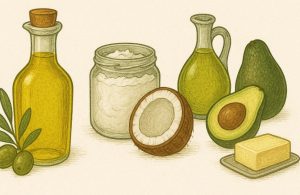
If you’re looking to reduce your rapeseed oil intake, there are several alternatives that offer better nutritional profiles and fewer concerns:
- Extra Virgin Olive Oil: High in antioxidants and monounsaturated fats; ideal for low to medium-heat cooking
- Avocado Oil: Neutral flavour, high smoke point, and nutrient-rich
- Coconut Oil: Excellent for baking and frying; high in saturated fat, so should be used sparingly
- Ghee or Clarified Butter: Suitable for high-heat cooking, and contains fat-soluble vitamins
Choosing oils that are cold-pressed, organic, and minimally refined is always a healthier move.
Final Thoughts: Should You Avoid Rapeseed Oil?
The answer isn’t black and white. Rapeseed oil isn’t inherently dangerous, but it’s not as healthy as many assumeespecially in its refined form.
While it can be part of a balanced diet, over-reliance on it, particularly in processed foods, may contribute to health issues over time.
Whenever possible, opt for cold-pressed or organic options and balance your intake with omega-3-rich foods such as fatty fish, flaxseeds, or walnuts. Consider natural oils that are richer in nutrients and free from harsh processing methods.
FAQs About Rapeseed Oil and Its Health Impact
Is rapeseed oil really unhealthy or just misunderstood?
Rapeseed oil is not inherently harmful, but refined versions lack nutrients and may cause issues when consumed in excess over time.
What makes rapeseed oil inflammatory?
Its high omega-6 content can promote inflammation when not balanced with omega-3s, especially in modern diets already rich in processed foods.
Is rapeseed oil safe for heart health?
Cold-pressed rapeseed oil may support heart health, but refined oil may pose risks when overused or reheated repeatedly.
Are there any benefits to using rapeseed oil?
Yes, it’s low in saturated fat, contains vitamin E, and has a high smoke point, but its benefits are reduced if it’s heavily processed.
Why do health experts still recommend it in some cases?
It’s often seen as a better alternative to saturated or trans fats, especially in large-scale food production or when cost is a factor.
Is rapeseed oil safe for children or pregnant women?
Generally, yes. However, cold-pressed, organic versions are considered safer and more beneficial for developing bodies.
What are some natural alternatives to rapeseed oil for cooking?
Olive oil, avocado oil, and coconut oil are all excellent choices, depending on the cooking method and flavour preference.

